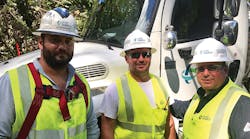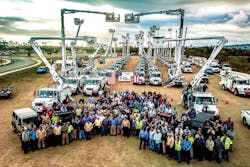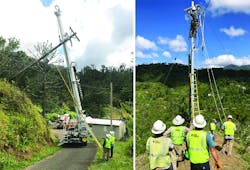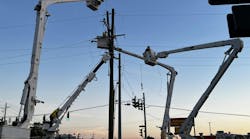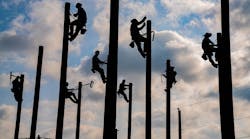Three months after Hurricane Maria unleashed her wrath on the island of Puerto Rico, many of Puerto Rico’s residents were still without power. To help turn the lights back on for these customers, Duke Energy sent linemen from across its service territories to provide aid.
One particular team from the Midwest included 16 linemen, five supervisors and a manager from Ohio and Kentucky and 12 linemen and two supervisors from Indiana. The team left on January 14 and returned on March 8.
Before the Duke Energy linemen arrived on the island, they knew Puerto Rico had experienced a Category 4 hurricane, but they didn’t know exactly what to expect. They had no idea where they would be sleeping, what they would be doing or where they would be working, but they were all willing to give up their time and work together to help illuminate the island of Puerto Rico once again.
Working in Remote Regions
Back at home, Duke Energy’s linemen are accustomed to working in well-manicured rights-of-way maintained by vegetation management crews and in-house tree trimmers. The power lines are constructed in easily accessible locations, such as along the side of highways, to reduce outage times and speed up restoration.
Working in Puerto Rico, however, was a completely different ballgame. The power lines zigzagged through the jungle to serve the residents, some who lived on the other side of a mountain. A lot of the infrastructure was not located anywhere near the road, and instead, it winded down the valleys and through the woods. And after four months, the vegetation had grown up around the downed infrastructure, making the restoration even more difficult for the linemen. But the Duke Energy crews all stepped up to the challenge safely.
Years ago, the power lines were installed by helicopter on the island. The lines are now located in remote, rough terrain that is nearly impossible to access using standard heavy equipment and bucket trucks. To get the job done, the linemen had to rely on old-school work by hand as well as rigging methods. Fortunately, Duke Energy sent a well-trained, experienced team of journeymen to the island, and these linemen were able to perform high-quality work in a safe manner without any injuries or incidents.
Performing Line Work
When the linemen first arrived on the island, they witnessed devastation from two hurricanes — Maria and Irma — that had hit 154 days before their arrival, yet many residents still did not have any power. Lines were down everywhere, the trash from the homes was scattered all over the ground and the roofs were destroyed. Three months after the storm, the linemen realized they had a lot of work ahead of them.
Each two-person crew from Duke Energy had a bucket truck and access to a rear property cart, and they were able to barge across their digger derricks, backhoes and stringing equipment. The line crews also had access to drones, which saved a significant amount of time.
Using the drone, the linemen flew a string across the mountain and dropped it off on the other side, where they could tie it off and pull larger ropes through to pull in the conductor. Without the drone, the project would have been delayed for weeks. In this particular spot, they heard that they expected it could take years before the power was turned back on.
Working as a Team
In addition to working in this remote, mountainous region, Duke Energy’s crews were also spread out across several cities and operation centers. All the Duke Energy linemen, from the Midwest, Florida and the Carolinas, worked as a team and coordinated the use of equipment, materials and resources.
Each day, the crews were in constant communication and provided assistance when necessary. Because the Florida team had the largest number of linemen, they would help out other crews who needed help. The crews would coordinate the use of equipment and share it on different mountainsides. After completing their work, they would send the equipment to other Duke Energy crews who needed it.
When they weren’t able to use equipment because of the terrain, the linemen worked by hand and climbed the poles rather than relying on bucket trucks. In turn, the local community was appreciative and fed the linemen lunch every day. They were so happy to have the line crews on the island, and they didn’t want them to leave. Duke Energy, however, had committed to a maximum of 60 days, and as such, the linemen had to return home on time.
Facing Shortages
During their time on the island, the linemen were spread out among three different hotels. One of the hotels was powered by a generator while the other two were up and running and had power. The linemen used a grass area at the Hilton resort as a staging area, and they were able to securely store their trucks in the location during the entire time they were on the island.
While the linemen had a place to sleep and store their trucks, they encountered a materials shortage during the restoration. When working in an area to get the power back on, they often didn’t have enough wire. To solve this problem, they would remove the old wire from the fields and the mountains and transport it to their new work location so they had material to work with.
All throughout the island, all the linemen encountered the same challenge: materials were in short supply. Rather than just sitting around and waiting for the materials to arrive, the linemen did the best with what they had on hand. The Puerto Rico residents motivated the linemen to keep working hard.
The Duke Energy crews worked from 5 a.m. to 7 p.m. The linemen were on a strict schedule of eating breakfast, packing lunch, eating in the field, driving to the next location, working all day and then eating dinner and going to bed. The next morning, the routine started all over again. After working 14 15-hour days, they had one day off.
Garnering Community Support
The linemen may have been away from home for 54 days, but while they were apart from their families, the local community fed the linemen and took good care of them. Case in point: one Duke Energy crew had to access a pole on top of a mountain, but they had no idea how to access it. To assist, the local men, women and children slashed paths in the brush with their machetes, cleared walkways for the linemen and led them to the exact spot where they needed to replace a pole. Because of the rough terrain, the linemen were all assigned a supervisor or engineer from the local utility. This person was familiar with the feeder maps, knew the local area and could help the crews access areas previously thought to be inaccessible.
Even the mayor of the city loaned bulldozers and backhoes to the crews so they could cut paths in areas without any roads. Using this equipment, the crews were able to get as far as they could into the woods to perform the line work.
The Duke Energy crews also used their own trucks, but they were often foiled by the wet weather. One day, the rain raised the water level in the river. Because the linemen left their trucks on the other side of the river, they got caught in the rainstorm coming down the mountainside. It was too slippery for them to drive the line trucks out of the muddy location, so the local residents told the linemen they would take care of their trucks. When the linemen returned the next day, their line trucks were safe, as promised, showing just how much they wanted their power turned back on.
Creating Lifelong Memories
When the Duke Energy crews returned home, they realized how many things they take for granted on their own system. They have all the technology, materials and equipment they need at their fingertips; they don’t have to wait for resources to be barged over from another location. Also the spans are much shorter at home than in Puerto Rico, where they can measure 1200 ft to even 1500 ft from one mountain to the next.
As linemen, the Duke Energy crews realized they have a unique skill set, and in the world they live in, people require electricity. The volunteers were all passionate about line work and willing to give their time to help the people of Puerto Rico.
During their time on the island, they were able to help a countless number of residents. Restoring power to a local school was one experience that stands out to the linemen. As soon as the lights came back, the children yelled, "Gracias Americanos!" These two words, hollered in unison by the schoolchildren, made the long days away from home worthwhile for the Duke Energy linemen, who made a difference in the lives of Puerto Ricans. ♦
Luis Amaya is a construction and maintenance supervisor for Duke Energy and has been with the company for 29 years. While in Puerto Rico, he helped provide assistance as a Spanish translator.
Craig Mustard has been with Duke Energy for seven years. He is a class A lineman who works out of the Brecon Operations Center in Ohio.
